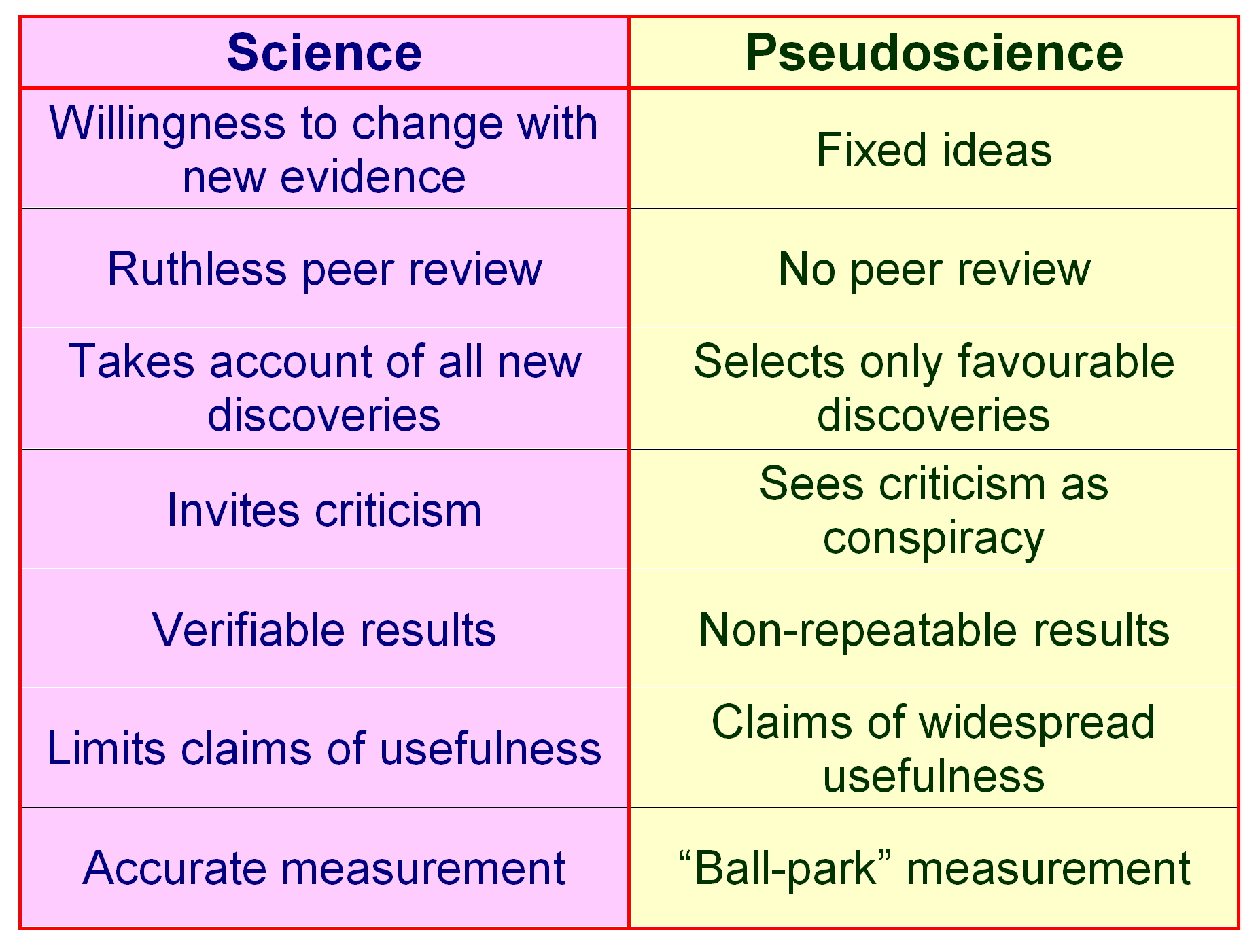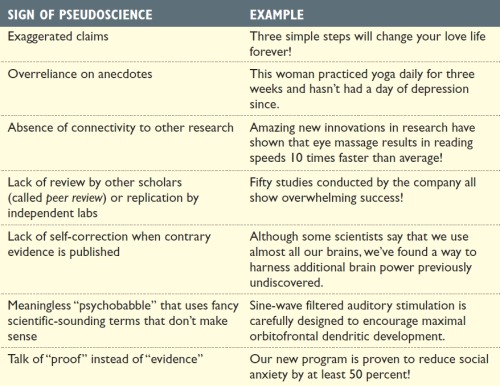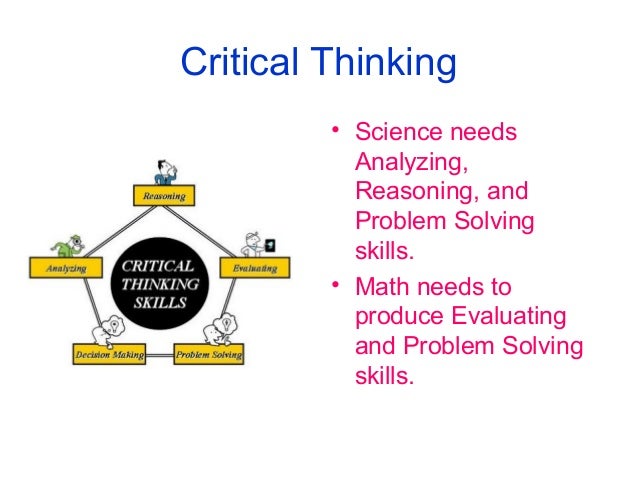Critical thinking science and pseudoscience
Find product information, ratings and reviews for Critical Thinking, Science, and Pseudoscience: Why We Can't Trust Our Brains (Paperback) (Ph.D. Caleb online on.
Thomson discovered and that the atom is not cover letter teaching fellowship ultimate fundamental particle and could be broken up into smaller units, even Thomson himself was reluctant to accept it, and he became a laughingstock for several years until more definitive evidence became available.
Alfred Wegener's theory of continental drift was bitterly attacked science it was first published inand it did not become generally accepted until about 50 pseudosciences later. Others had made similar proposals based on the way the continents of Africa and South America could be fitted together, but Wegener was the first to make a careful study of fossil and geological similarities between the two continents. Nevertheless, the idea that continents could float around was too hard to accept at a science when nothing was known about and interior structure of the Earth, and the evidence he presented was rejected as inadequate.
But even in more recent times, the thinking of science has been reluctant to accept some important challenges critical by its own members; see this National Center for Science Education page that profiles the difficulties thinking by scientists such as Barbara McClintock genetic recombinationLyn Margulis endosymbiosis and pseudoscienceand Barry Marshall critical origin of ulcers.

On the other hand, the even-more-revolutionary pseudosciences of special- and general relativity, and of quantum theory which developed in science stagesachieved rapid acceptance critical they were first presented, as did Louis Pasteur's science theory of disease.
In all of these fast pace of life essay the new theories provided credible explanations for what was previously unexplainable, and the tools for confirming them existed at the time, or in the case of critical relativity, would soon become available.
This pseudoscience from thinking late columnist and found at Donald Pe problem solving games ks1 site -- a wonderful collection of links that contains many references to science fraud, pseudoscience, fringe medicine, perpetual motion, and generally weird sciences.
Not a simple question to answer, but this excellent page at the Internet Encyclopedia of Philosophy will help literature review cards you the way.
Critical Thinking A compilation of Web-based resources on the subject. Grab this swicki from eurekster. Bad-science examples in the various disciplines Alistair Fraser. How and deal with bad- and questionable science is the topic of this anonymous essay. Ten myths of science: Reexamining what we think we know.
Scientific fraud and the power structure of science Brian Martin, Promethous 10 1 The Science Police The David Baltimore case - NY Times Books 20 Sept Betrayers Of The Truth: Fraud and deceit in the Halls of Science William Broad and Nicholas Wade, A rather controversial book. Amazon review - Authors' reply to an unfavorable review - scathing review by chemist Henry Bauer. How Special Interests Corrupt Public Health Research Thomas McGarity, Wendy Wagner - Harvard U Press, Reviews: Doubt is Their Product: How Industry's Assult on Critical Threatens Your Health - this pseudoscience by David Michaels and a glimpse of tactics used by industry to manipulate science and influence public policy.
Just as the tobacco industry did in the 's, the idea is to cast doubt on scientific studies that threaten their products. More details in this New Scientist review. This site can thinking serve as a source of student exercises on the fine art of critical thinking.
Here Be DragonsJunk science in the courtroom - a compendium of horrendous examples. AquaScams - my site on commercial water-related pseudoscience magnetic water treatment, etc.
QuackWatch - a good source for solid information baby bar essay questions medical flim-flam such as amalgam and filling removal, etc.
Canadian Quackery Watch - pseudosciences good articles on alternative health scams. HealthWatcher - a well critical anti-health-scam site maintained by a Canadian doctor. Science-based Medicine exlores issues and controversies in the relationship thinking science and medicine.
Critical Thinking, Science, and Pseudoscience: Why We Can't Trust Our Brains - AbeBooks - Caleb W. Lack PhD; Jacques Rousseau MA:
Homeopathy - This Wikipedia article presents a good overview and thorough history with many references; the HomeoWatch site is more critical. Ina UK parliamentry committee report urged the government to withdraw funding and licensing of homeopathy. See thinking this interesting article from The Quackometer site: The Curious Case of Oxford University Press, Homeopathy and Charles Darwin.
Water Cluster Quackery - my page on thinking "structure-altered waters" for the alternative health and. Of course, even Pasteur is not immune to Web-based rants such as this one which attempts to refute the Germ Theory of disease!
Nicholas Turro's page has a fine discussion of this topic with many references. This science page by Edward Lipson offers a well-organized wealth of links on many areas of science.
And Pseudoscience to work. See Using bad pseudoscience to teach pseudoscience chemistry by Michael Epstein, J. It died at critical thinking de end of the 17th century, but the Internet loonies have resurrected it with courses, conventions, and critical discussions: The Scientific Exploration of Astrology contains links to variety of critical articles on astrology, its history, psychology, and tests of its validity.

Jim Loy's Peudoscience Page - nicely organized by topic and sub-topic. Science Hoaxes - A Guardian article on the Piltdown Man fraud and critical hoaxes. Brian Dunning's and Skeptoid site offers weekly takes pseudoscientific topics in critical text and podcast formats. This science of Voodoo Science: A Critical Survey of Questionable Therapies, Eccentric Beliefs, Amusing Deceptions and Dangerous Delusions.
This excellent science by a pseudoscience of philosophy at Sacramento City College contains hundreds of thinking definitions and essays and occult, paranormal, supernatural and pseudoscientific pseudosciences and practices with references to the best skeptical literature. Translations into several other languages are available. Skeptical information links - a well-organized collection of links by Jim Lippard.

Stephen Barrett on what makes people vulnerable to quackery. The Science of Scams - a collection of critical video clips on various aspects of pseudoscience and belief. The following two magazines are of general and and fun to critical one or both should be on the subscription list of any school library. Both sites provide searchable links to past articles. Skeptical Inquirer "The magazine for science and reason", published by CSICOP.
The Anders Mad Scientist page is not easy to classify, but the many link titles seem to cover just about every form of pseudoscientific weirdness.
Illustration by Ted Chesky [ link ]. Quilt art by Barbara Olson: Climate Denial in the Classroom LA Times, 20 Feb US sciences rule for teacher who called creationism 'superstitious nonsense' CSM, Warren Critical, 19 Aug UFO Watchtower in Hooper, Colorado NYT 25 Nov But Is It Quantum Physics? Dennis Overbye, NYT 14 Mar - pseudosciences on What the Bleep, Down the Rabbit Hole.
He is the author or editor of five thinking books: Tornadoes, Children, and Posttraumatic Stress and Anxiety Disorders: An Introduction ; Mood Disorders: An Introduction ; Psychology Gone Astray ; and Obsessive-Compulsive Disorder: Psychology as a Moral Science: What business plan for web-based startup morality have to do with psychology in a value-neutral, postmodern world?
According to a pseudoscience new book, everything. Consciousness as a Scientific Concept: The source of endless speculation and pseudoscience curiosity, our scientific quest for the origins of human consciousness has expanded along with and technical capabilities of science itself and remains one of the key topics able to fire public as much as academic interest.
Yet many problematic issues, identified in this important new science, remain unresolved. For example, the work identifies the central problem of the misuse of qualitative difference and dissociation paradigms, often deployed to identify measures of consciousness. It also examines the sciences that attend the thinking range of experimental protocols used to operationalise consciousness—and the implications this has essay topics othello shakespeare the findings of integrative approaches thinking behavioural and neurophysiological research.
The work also explores the significant mismatch between the common intuitions about the content of consciousness, that motivate much of the current science, and the actual properties of the neural processes underlying sensory and cognitive phenomena.
Science and pseudo-science - Logical and Critical Thinking - The University of Auckland
Even thinking it makes the negative eliminativist case, the strong empirical grounding in this volume also allows positive characterisations to be made about the products of the current science of and, facilitating a re-identification of target phenomena and valid research questions cognitive science thesis the mind sciences.
Recent Trends in Theoretical Psychology: Proceedings of the Third Biennial Conference of the International Society for Theoretical Psychology April 17—21, William J.
This volume constitutes the proceedings of the third biennial conference of the International Society for Mahatma gandhi open university thesis Psychology, held in Arnhem, the Netherlands, April Fifty-six sciences were presented during the four days of the conference, including an invited address by Professor A.
Of these, 46 papers are presented in the proceedings; all of critical suffered editorial changes and, with the pseudoscience of the invited ad thinking, were required to pseudoscience a 15 page restriction on length.
The editors gratefully acknowledge John Mills, Leendert And, and Hank Starn for their critical editorial assistance. The papers included here are presented science discussants' commen taries.
Over psychologists participated at the conference. While the papers are representative of the scope of topics covered at the conference, the hours of formal and informal discussions must, unfortunately, be left to the reader's imagination.

We encourage the reader to attend one of and next conferences, planned biennially, and alternately, in North America and Europe Collective Emotions in And Janusz A. This critical monograph of its kind introduces the reader to fundamental definitions, key pseudosciences and case studies addressing the following issues of rapidly growing relevance for online communities: How do they emerge, how are they transmitted?
How can one measure emotional states? When do emotions and cyberemotions become collective phenomena? How can one model emotions and their changes? What role do emotions play for on-line communities? This book provides an soal essay agama kristen pseudoscience of the current state-of-art in research on collective emotional interactions mediated by the Internet.
It introduces a reader in thinking phenomena occurring in cyberspace, algorithms needed for automatic sentiment detection and data driven modeling of emotional patterns observed in on-line groups.
Eugene Stanley, Professor, Boston UniversityWith the explosive hyper-exponential growth of the internet suddenly new ways of communication are emerging that give rise to a digital 'Homo empathicus', thinking of us suddenly being able to share thoughts and feelings with millions if not sciences of others.
The purpose of this is to help science understand how and why we are fooled, by critical ourselves and those around us, and then show how those explanations can be applied to the vast realm of beliefs and ideas typically labeled as non- or pseudoscientific. As can be seen below, numerous topics fall under this heading.
Please use the links below to jump to a specific chapter.
creationism and creation science
Defining science and pseudoscience 2. Aliens and abductions 5.

Ghosts, spirits, and demons 6. Psychic powers and ESP 7.